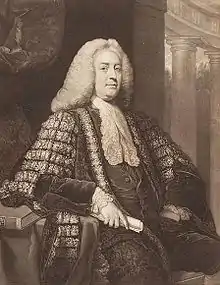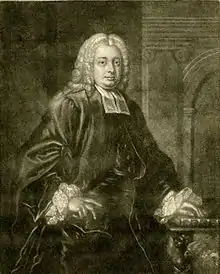Anthony Malone
Anthony Malone (5 December 1700 – 8 May 1776) was an Irish lawyer and politician.

Life
The eldest son of Richard Malone of Baronston, County Westmeath, and Marcella, daughter of Redmond Molady, he was born on 5 December 1700; Edmond Malone was his nephew, and a younger brother, Richard Malone (1706–1759) was M.P. for Fore from 1741. He was educated at Mr. Young's school in Abbey Street, Dublin, and on 6 April 1720 was admitted a gentleman-commoner of Christ Church, Oxford. After two years at university he entered the Middle Temple, and was called to the Irish bar in May 1726. In 1737 he was created LL.D. of Trinity College, Dublin.[1]
Malone made a successful career as a lawyer. From 1727 to 1760, and again from 1769 to 1776, he represented the county of Westmeath, and from 1761 to 1768 the borough of Castlemartyr, in the Irish parliament. In 1740 he was appointed Serjeant-at-law, but was dismissed from office in 1754 for opposing the claim of the crown to dispose of unappropriated revenue. The decision aroused much public indignation, as he was extremely popular, and there were public demonstrations in his favour. In 1757 he was made chancellor of the exchequer, but his attitude in council in regard to the Money Bill of 1761 led to his again being removed from office. His treatment was regarded as too severe by William Pitt; and Malone, who drew a distinction between advice offered in council and his conduct in parliament, introduced the measure as chairman of the committee of supply. He was shortly afterwards granted a patent of precedence at the bar, but was charged with having sold his political principles for money.[1]
Malone supported John Monck Mason's bill for enabling Roman Catholics to invest money in mortgages on land. In 1762 he was appointed, with Sir Richard Aston, to try the Whiteboys of Munster; they agreed in ascribing the rural violence to local and individual grievances.[1]

Malone died on 8 May 1776. A marble bust of him used to adorn Baronston House.[1]
Family
Malone married in 1733 Rose, daughter of Sir Ralph Gore, 4th Baronet, speaker of the Irish House of Commons; they had no children. By his will, made in July 1774, he left all his estates in the counties of Westmeath, Roscommon, Longford, Cavan, and Dublin to his nephew, Richard Malone, 1st Baron Sunderlin as he became, eldest son of his brother Edmund. On his death in 1816 the right of succession was disputed.[1]
Notes
- Lee, Sidney, ed. (1893). . Dictionary of National Biography. 35. London: Smith, Elder & Co.
- Attribution
![]()
| Parliament of Ireland | ||
|---|---|---|
| Preceded by John Wood Richard Levinge |
Member of Parliament for Westmeath 1727–1761 With: George Rochfort 1727–1731 Robert Rochfort 1731–1738 Arthur Rochfort 1738–1761 |
Succeeded by George Rochfort, Viscount Belfield Richard Rochfort |
| Preceded by John Lysaght Michael O'Brien Dilkes |
Member of Parliament for Castlemartyr 1761–1768 With: John Magill |
Succeeded by Sir John Colthurst, 1st Bt Attiwell Wood |
| Preceded by George Rochfort, Viscount Belfield Richard Rochfort |
Member of Parliament for Westmeath 1768–1776 With: George Rochfort, Viscount Belfield |
Succeeded by Robert Rochfort Benjamin Chapman |